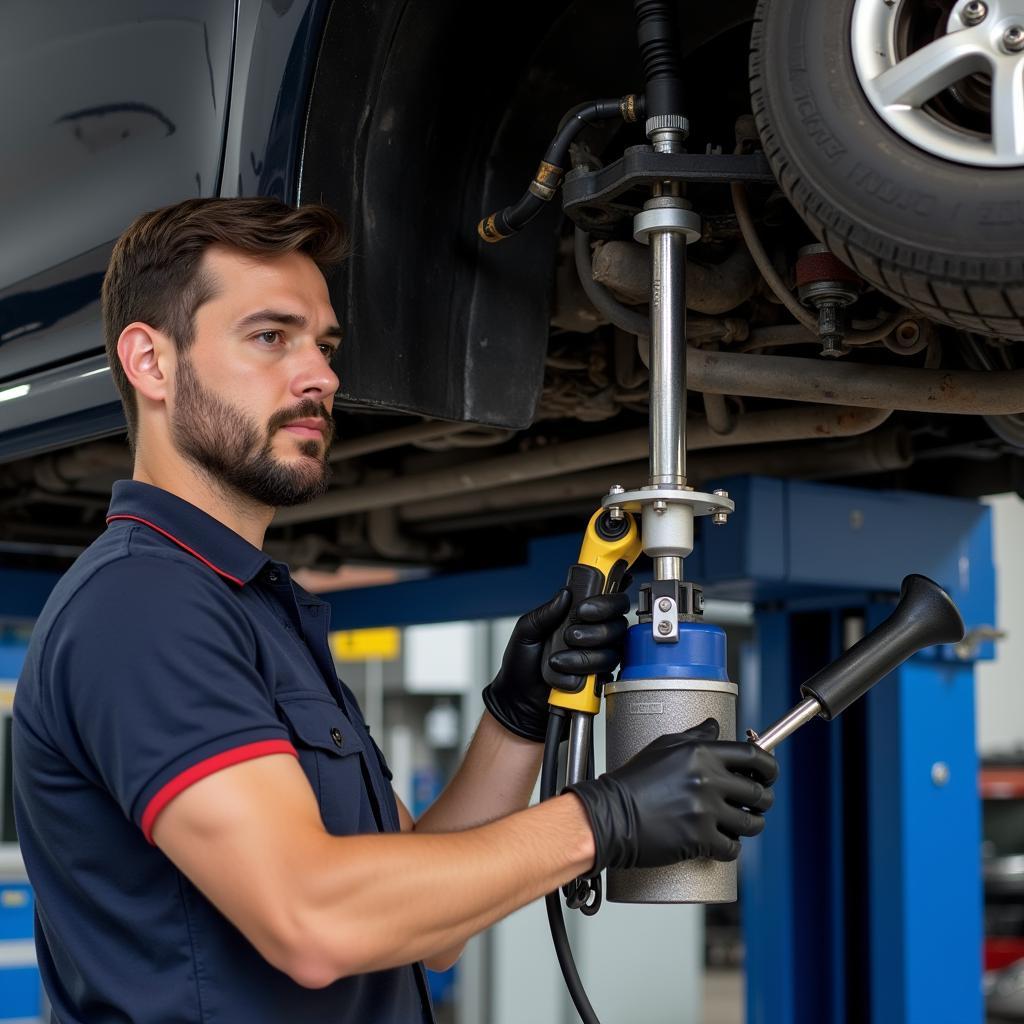Dealing with pressure problems in your car lift can be a real headache. Whether you’re a seasoned mechanic or a DIY enthusiast, a malfunctioning lift can bring your work to a screeching halt. This article will guide you through common pressure-related issues, their causes, and how to fix them, ensuring your car lift operates safely and efficiently.
A properly functioning car lift is crucial for any garage or workshop. However, pressure issues can disrupt workflow and compromise safety. Let’s delve into the most prevalent pressure problems with car lifts.
Common Pressure Problems with Car Lifts
Several issues can arise from pressure problems, ranging from slow lifting speeds to complete failure. Identifying the root cause is crucial for effective troubleshooting. Some common problems include a car lift struggling to reach its maximum height, the lift lowering unexpectedly, or unusual noises emanating from the hydraulic system.
Diagnosing Low Pressure Issues
Low pressure is often the culprit behind a sluggish or unresponsive car lift. This can be due to leaks in the hydraulic system, a faulty pump, or worn-out seals. Check your hydraulic fluid levels. Low fluid levels can directly contribute to pressure problems. ppt everyday problems with car outlines some common car problems in general that might be helpful.
Identifying High Pressure Problems
While less common, excessively high pressure can also cause problems, potentially damaging seals and other components. A malfunctioning pressure relief valve is often the cause of high pressure.
Troubleshooting and Solutions for Pressure Problems
Once you’ve identified the likely source of the pressure problem, you can start troubleshooting.
Checking the Hydraulic Fluid
Start by inspecting the hydraulic fluid level. If it’s low, top it off with the correct type of fluid specified by the manufacturer. Using the wrong fluid can lead to further problems, as discussed in car lift hydraulic fluids problem with theta.
Inspecting for Leaks
Thoroughly examine all hydraulic lines, connections, and cylinders for any signs of leaks. Even a small leak can significantly impact pressure. Address any leaks promptly by tightening connections or replacing damaged components.
Examining the Pump
If the fluid level is adequate and there are no visible leaks, the pump may be the problem. Check the pump for proper operation and replace it if necessary.
Testing the Pressure Relief Valve
If you suspect a problem with the pressure relief valve, it’s best to have it tested by a qualified technician. A faulty valve can lead to dangerous pressure build-up.
“Regular maintenance is key to preventing pressure problems,” advises Michael Stevens, a seasoned automotive lift technician with over 20 years of experience. “Simple checks like inspecting fluid levels and looking for leaks can save you a lot of trouble down the road.”
 Technician Repairing Car Lift Hydraulic Cylinder
Technician Repairing Car Lift Hydraulic Cylinder
Bleeding the Hydraulic System
Air trapped in the hydraulic system can also cause pressure problems. Bleeding the system removes any air pockets, restoring proper pressure and function. Do you think cars in certain locations have more issues? Check out do michigan cars have more problems. Sometimes seemingly unrelated problems, like those associated with car wrapping, car wrapping problems, can highlight the importance of proper maintenance and care.
Conclusion
Pressure problems with your car lift can be frustrating, but with a systematic approach to troubleshooting, you can often identify and resolve the issue. Regular maintenance is essential for preventing future problems and ensuring the longevity of your car lift. By understanding the common causes of pressure problems and following the steps outlined in this article, you can keep your car lift operating safely and efficiently. Remember, safety is paramount when working with car lifts. If you’re unsure about any aspect of the repair or maintenance process, consult a qualified technician. For more information on car problems, you might find this resource helpful: lifter car problem.
Need further assistance with your car lift pressure problem? Contact AutoTipPro at +1 (641) 206-8880 or visit our office at 500 N St Mary’s St, San Antonio, TX 78205, United States. We’re here to help!






Leave a Reply